Gareth’s brain tumour diagnosis story
Gareth was 38 when he died due to a glioblastoma brain tumour in January 2019.
He was diagnosed with the stage four tumour on his left frontal lobe in November 2017, having spent much of his life in psychiatric hospitals.
Gareth had received mental health treatment since the age of 17, following a diagnosis of schizophrenia and psychosis.

Barbara, Gareth’s mum, and her heartbroken family believe he may have survived if any possible symptoms of his brain tumour had been picked up earlier.
They are calling for more awareness of how brain tumours can cause problems like personality changes, communication difficulties and psychiatric symptoms such as depression and anxiety.
Barbara said: “It is absolutely agonising for me to think he could have been around for at least another five years, and his quality of life could have been much higher.”
The symptoms of his apparent mental illness began in 2014 and included verbal outbursts, trembling, dribbling, numbness, pins and needles and difficulties communicating.
Gareth was discharged from hospital in October 2017 but experienced a seizure and collapsed the following month.
He was taken to A&E, where he was given an MRI scan and the glioblastoma was discovered.
He underwent a three-hour operation in November 2017 to remove part of the tumour but was readmitted to hospital in December 2018 and died five weeks later.
Barbara said: Gareth’s hospital apologised to Barbara and told her Gareth’s case will influence the training their staff receive.
“Although Gareth’s health improved for a while after the operation, I find it difficult that his original diagnosis was never reviewed or the possibility of anything other than a mental health issue considered.
“I want to raise awareness of the potentially overlapping symptoms between mental health issues and brain tumours.”
Gareth’s story is one of the case studies in The Brain Charity’s report on the delayed diagnosis and misdiagnosis of neurological conditions. Read our It’s all in your head report here.











